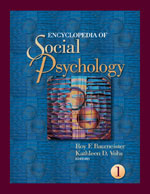iconEncyclopedia
Encyclopedia of Social PsychologyPub. date: 2007 | Online Pub. Date: October 03, 2007 | DOI:http://dx.doi.org/10.4135/9781412956253 | Print ISBN: 9781412916707 | Online ISBN: 9781412956253 | Publisher:SAGE Publications, Inc.
About this encyclopediaHappiness
Richard E. Lucas
When psychologists use the term happiness , they tend to mean one of two things. In the narrow sense, happiness is a specific emotion that people feel when good things happen. It includes feelings of pleasantness along with moderate levels of arousal. In addition, the emotion often co-occurs with a specific facial expression: the smile. Happiness can be distinguished both from negative emotions such as sadness, fear, and anger and also from other positive emotions such as affection, excitement, and interest. People from around the world tend to have a similar concept for happiness and can recognize happiness in others. As a result, the emotion of happiness is often included as one of a small number of basic emotions that cannot be broken down into more fundamental emotions and that may combine to form other, more complex emotions (in fact, it is sometimes the only positive emotion that is considered ...
Users without subscription are not able to see the full content on this title. Please, subscribe or login to access all content on this website.

